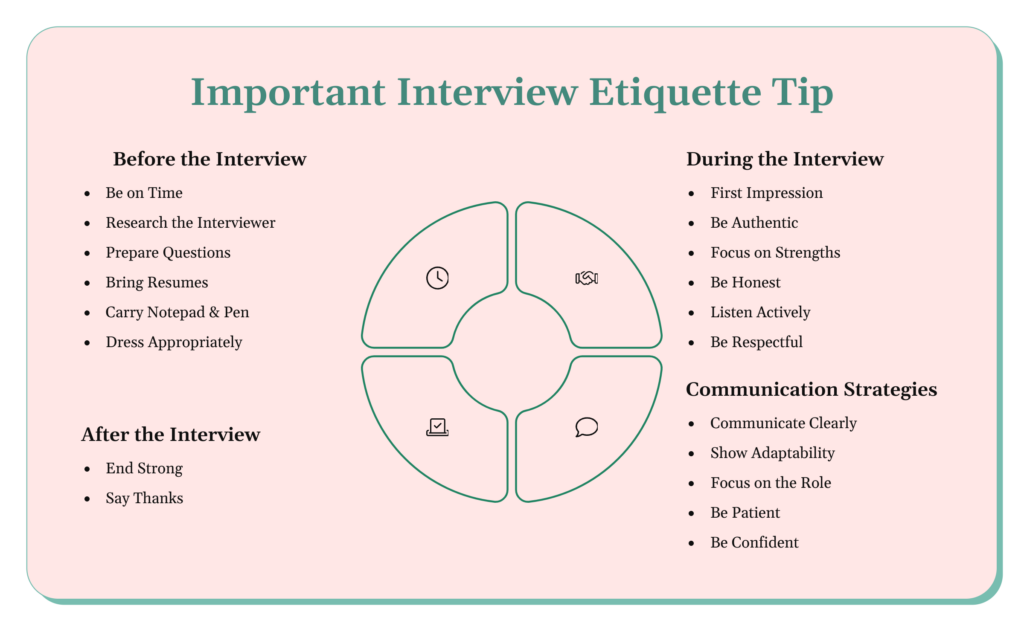
Quick Summary
Interviews are a significant milestone in everyone’s life. No matter the profession, almost everyone has faced an interview at some point. These interviews often determine one’s career trajectory, making it essential to approach them with confidence and preparation. This is where mastering interview etiquette becomes a game-changer, helping you stand out in a competitive landscape.
One of the most important aspects of interview etiquette is creating a strong first impression. An interviewer often evaluates a candidate based on their poise, social skills, and communication abilities even before diving into the questions. Your attitude, body language, and ability to engage in a respectful exchange of ideas can set the tone for the entire interaction.
Confidence plays a key role in making the right impression. A confident demeanor shows that you are prepared and capable, while also reflecting your enthusiasm for the role. Effective communication, which includes listening attentively and responding thoughtfully, demonstrates respect and professionalism—two core components of good interview etiquette.
By adhering to essential interview etiquette, you can significantly increase your chances of success. Whether it’s dressing appropriately, arriving on time, or showing gratitude, every detail matters. These habits not only leave a lasting impression but also showcase your commitment to excellence, paving the way for a promising career.
There are several essential interview tips that one should follow to ensure success. This article highlights the top 20 job interview etiquette tips to help you ace your next interview.

Interview etiquette defines how you conduct yourself in the meeting. No matter how many interviews you’ve had, your goal is to present confidence and competence. From start to finish, your behavior shapes the impression you leave on potential employers. Professionalism, punctuality, and positive body language play a crucial role in how you are perceived. Listening attentively, responding thoughtfully, and maintaining eye contact can help establish credibility. A well-prepared, respectful, and engaging approach increases your chances of making a lasting impact.
When introducing yourself in an interview, start with a confident greeting, state your name, briefly highlight your professional background, and express enthusiasm for the opportunity.

One of the most important interview tips to remember is the value of punctuality. I want you to know that arriving on time shows professionalism, respect, and enthusiasm for the opportunity. Aim to reach the interview location at least 10 to 15 minutes before the scheduled time. This allows you to settle in, gather your thoughts, and prepare yourself mentally for the conversation.
Taking the time to research the interviewer is an essential part of interview preparation. Knowing the interviewer’s name, along with ensuring you understand the correct spelling and pronunciation, shows attention to detail and professionalism. It reflects your enthusiasm, preparedness, and genuine interest in the role and the company.
A helpful job interview tip is to prepare a short list of thoughtful questions in advance. Asking questions during the interview shows the interviewer that you are genuinely interested in the role and the company. It demonstrates your initiative, enthusiasm, and commitment to understanding the organization and its goals.
However, avoid preparing overly basic or generic questions that may suggest a lack of research or effort on your part. Instead, focus on insightful and relevant questions that reflect your understanding of the company and the position while showing your curiosity and professionalism.
One must carry 2-3 copies of one’s resume and cover letter to an interview. Sometimes, one may even be required to submit one’s resume to multiple people. Thus, one must carry copies of resumes and documents in an organized manner.
It is one of the tips for job interviews that helps prepare for the future. It would help if you carried a notepad and pen to jot down your thoughts after the interview. You must write down everything you remember and your impression of the interview.

Greetings are a crucial job interview etiquette point. It would help if you greeted the interviewer with a smile and a handshake. You must also maintain eye contact and try not to stare. It reflects confidence and is one of many successful job interview tips.
Generic topics bring life to the interview. One must never jump right into business but try to ease into it. You can start by asking generic questions to build rapport. In case of confusion, you may simply follow the interviewer’s lead.
While it’s natural to want to appear confident during an interview, trying to hide nervousness can come across as insincere and may negatively impact your performance. Admitting your nervousness to the interviewer, if done appropriately, is actually a part of good interview etiquette. You can mention it in a calm and professional manner during the conversation, such as saying, “I’m a little nervous, but I’m very excited about this opportunity.”
This approach can help relieve your stress and create a more comfortable and open environment for both you and the interviewer. It shows honesty, self-awareness, and the ability to manage emotions—qualities that are often appreciated by employers. Being transparent about your feelings allows you to connect better with the interviewer and focus on presenting your skills and qualifications effectively.
Maintaining focus on yourself during an interview is one of the most effective interview practices. During the conversation, emphasize your skills, eagerness to learn, and the unique qualities and attributes you bring to the role. Demonstrating confidence in your abilities can leave a strong impression on the interviewer.
It’s important to avoid apologizing for any lack of experience. Instead, shift the focus toward what you can contribute to the organization and how your strengths align with the requirements of the role. By highlighting your willingness to grow, adapt, and contribute, you can turn any perceived gaps into opportunities to showcase your determination and potential.
Lies and exaggerations might seem like an easy way to impress an interviewer, but they can backfire and damage your credibility in the long run. Always strive to be as honest and transparent as possible during the interview process. Speaking the truth builds trust and demonstrates integrity, which are qualities employers value highly.
Active listening is a vital part of interview etiquette. Paying attention to your interviewer shows respect, professionalism, and genuine interest in the conversation. If something is unclear, don’t hesitate to ask for clarification or request a restatement to ensure you fully understand the question or context.
However, it’s important to stay focused and stick to the topic throughout the interview. Asking relevant questions or seeking clarification should always align with the flow of the conversation and the role you are being considered for. Active listening not only helps you respond thoughtfully but also leaves a positive impression on the interviewer.
Disregarding anyone in an interview is not just bad interview etiquette but also a missed opportunity to learn and engage. Make sure to listen attentively to everyone on the panel. Each person brings unique perspectives and insights, and respecting their contributions can help you make a more positive impression. Remember, showing respect and consideration to all participants reflects your professionalism and interpersonal skills. Ensure that you listen to everyone on the panel.
Interviewers are interested in candidates who can express themselves clearly and effectively. It doesn’t matter if they speak slowly or correct themselves during the conversation. What truly stands out is their grammatical fluency. Proper grammar reflects a candidate’s ability to communicate professionally and effectively, which is a key aspect of good interview etiquette. Mastery of grammar not only showcases attention to detail but also indicates respect for the interview process and the interviewers. This fluency can leave a positive impression and demonstrate your readiness for the role.
While personal questions might not always be part of the standard interview, they often come up. It’s crucial to handle these questions without losing composure, demonstrating good interview etiquette. Staying calm and composed shows your ability to navigate unexpected queries professionally. This is an important tip for a successful interview, as it reflects your readiness and adaptability in any situation. Being prepared for personal questions also indicates your confidence and poise, essential traits for making a positive impression.
One should never ask about the benefits or salary of a job during the interview. This approach reflects poor interview etiquette and indicates a lack of preparation. Instead, it’s advisable to research beforehand using salary and career websites to gain a rough idea of the compensation. This demonstrates professionalism and a genuine interest in the role and company, rather than just the financial aspects. Proper research helps you make informed decisions and allows you to focus on showcasing your skills and fit for the position during the interview.
One must never expect a job offer after the first interview. It’s essential to understand that companies often conduct multiple interviews before making a hiring decision. This approach ensures they thoroughly evaluate candidates. Demonstrating good interview etiquette involves being patient and understanding that the hiring process can be extensive. Proper preparation and a positive attitude across all interview stages can significantly enhance your chances of success. Remember, each interview is an opportunity to showcase your skills and fit for the role.
Closing an interview with a smile and an enthusiastic attitude is key. Show good interview etiquette by asking about the next steps, thanking the interviewer, and expressing genuine interest in the job. This reflects your courteousness and kindness, leaving a lasting positive impression. Demonstrating enthusiasm and appreciation can set you apart from other candidates and show that you are excited about the opportunity.
A thank-you note to the interviewer is a must after an interview. Irrespective of whether it was good or bad, one must always express gratitude. This part of the interview can reflect good interview etiquette and make a difference.
Confidence is vital in all interviews. Whether it is a job interview or an interview for college admissions, anyone will pick a confident candidate over others. Thus, one must always be self-confident and optimistic during interviews.
It is an underrated interviewing tip, but a good outfit can make a huge difference. It reflects a candidate’s confidence and effort put into the interview. Proper dressing helps them stand out from others and crack the interview easily.
Your body language and eye contact significantly impact how you are perceived during an interview. Maintaining an upright posture, offering a firm yet natural handshake, and using open gestures signal confidence and professionalism. Avoid fidgeting, slouching, or crossing your arms, as these can indicate nervousness or defensiveness.
Eye contact is equally important—it shows attentiveness and sincerity. Make steady eye contact when speaking and listening, but avoid prolonged staring, which may come off as intimidating. Instead, use natural breaks to look away briefly and maintain a relaxed demeanor. Nodding occasionally and mirroring the interviewer’s body language subtly can also create a positive connection. When combined with clear speech and a composed presence, effective body language and eye contact can leave a lasting impression and boost your chances of success.
Virtual interviews have become a common part of the hiring process, requiring candidates to adapt their approach for a digital setting. To create a strong impression, follow these essential etiquette tips:
By following these virtual interview etiquette tips, you can make a strong impression and increase your chances of success.
Interviews are a comprehensive process, but with proper interview etiquette, anyone can succeed. Mastering interview etiquette involves understanding the nuances of the interview process and implementing successful interview tips. It’s essential to thoroughly read and implement these tips to make a positive impression on the interviewer. Practicing interviews is another valuable strategy that can significantly boost your confidence and prepare you for a wide range of questions.
One of the key aspects of interview etiquette is to remain composed and professional, regardless of the situation. This means listening carefully to every question, responding thoughtfully, and demonstrating your qualifications and enthusiasm for the role. Additionally, understanding the company culture and aligning your answers to reflect your compatibility with their values can further enhance your chances of success. Preparation is key, so start refining your skills today.
By focusing on interview etiquette and continuously improving your approach, you can increase your chances of landing your desired job. Remember, each interview is an opportunity to learn and grow, so don’t wait to get started!
Ace your job interviews with tailored tips for a great first impression! Explore our guide on Interview Tips.
Interview etiquette refers to how you present yourself professionally during a job interview, including your behavior, communication style, and interpersonal skills. It covers aspects such as dressing appropriately, maintaining eye contact, speaking confidently, and demonstrating respect through active listening and thoughtful questioning.
The 5 C’s of interviewing—Competence, Communication, Confidence, Connection, and Curiosity—are key to making a strong impression. Mastering these skills helps you showcase your qualifications, engage effectively, and increase your chances of landing the job.
Top 5 Things to Do in an Interview-
Do your homework.
Make a good first impression.
Listen and respond accordingly.
Prepare smart, open-ended questions.
Sell your strengths and expertise.
Top 5 Things to Avoid in an Interview-
Don’t speak poorly about past employers.
Don’t falsify information.
Don’t speak over the interviewer.
Don’t assume it isn’t an interview.
Don’t let past rejections affect future ones.
The three golden rules of an interview are:
Research and Preparation – Understand the company, role, and interviewer to showcase your knowledge and enthusiasm.
Demonstrate Professionalism and Engagement – Dress appropriately, communicate clearly, listen actively, and show confidence.
Follow-up and Thank You – Send a thank-you note or email expressing gratitude and reinforcing your interest in the position.
Basic etiquette refers to a set of unwritten rules that guide appropriate behavior in various situations, including social gatherings, professional environments, and dining settings. It ensures respect, politeness, and consideration for others, helping to create positive interactions and lasting impressions.
A thank you email is a great way to help you stand out among others interviewing for the position and leave a good impression with the hiring manager or interviewer. Additional reasons why sending a thank you email after an interview is important to include: It allows you to reiterate your interest in your position.

Authored by, Amay Mathur | Senior Editor




Amay Mathur is a business news reporter at Chegg.com. He previously worked for PCMag, Business Insider, The Messenger, and ZDNET as a reporter and copyeditor. His areas of coverage encompass tech, business, strategy, finance, and even space. He is a Columbia University graduate.
Editor's Recommendations
Chegg India does not ask for money to offer any opportunity with the company. We request you to be vigilant before sharing your personal and financial information with any third party. Beware of fraudulent activities claiming affiliation with our company and promising monetary rewards or benefits. Chegg India shall not be responsible for any losses resulting from such activities.
Chegg India does not ask for money to offer any opportunity with the company. We request you to be vigilant before sharing your personal and financial information with any third party. Beware of fraudulent activities claiming affiliation with our company and promising monetary rewards or benefits. Chegg India shall not be responsible for any losses resulting from such activities.